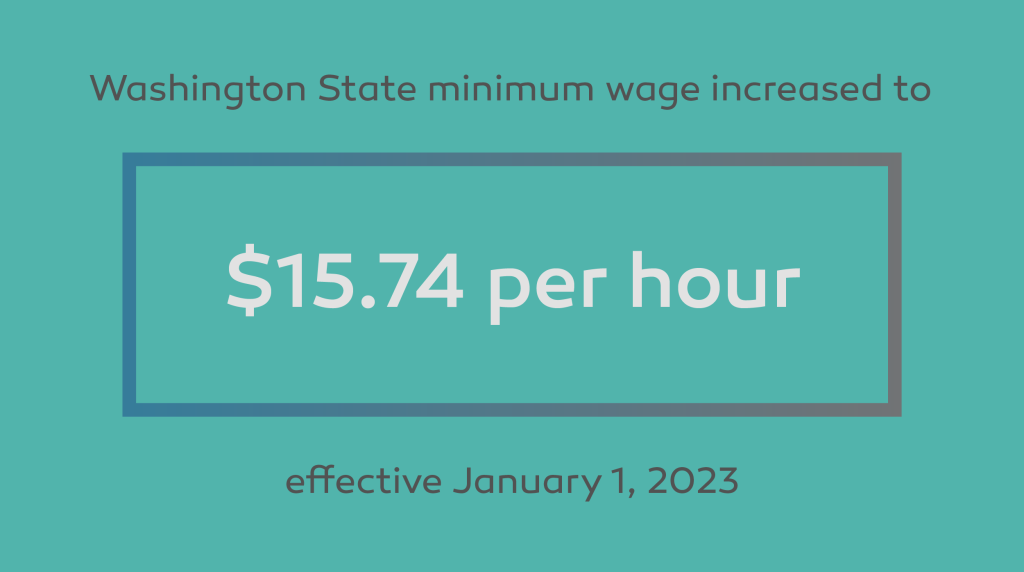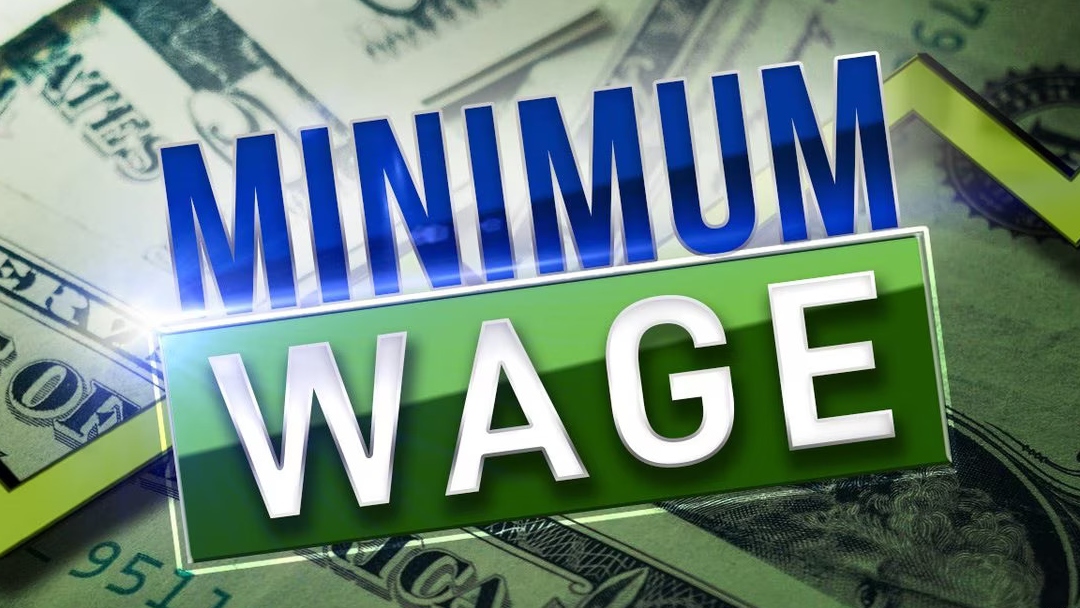What Is Minimum Wage In Washington? Navigating Economic Equality
What is minimum wage in Washington? Explore the historical evolution, economic impact, and social significance of Washington's minimum wage in 2023. Delve into the state's commitment to economic justice and the challenges it faces in maintaining a high cost of living in urban areas.
Author:Stefano MclaughlinReviewer:Luqman JacksonNov 05, 202319.1K Shares262.4K Views

The minimum wage is a pivotal element in any nation's labor market, reflecting its commitment to ensuring fair compensation for workers. In Washington, the story of minimum wage is marked by a commitment to progressive values and economic justice. So, what is minimum wage in Washington?
As of 2023, the minimum wage stands at $15.74 per hour, placing it among the highest in the United States. This comprehensive guide will delve into the history, evolution, and impact of Washington's minimum wage, shedding light on the policies, struggles, and victories that have brought it to its current standing.
Washington Minimum Wage History
Washington State's journey in setting and adjusting its minimum wage has been marked by a commitment to economic fairness and social progress. The history of the minimum wage in Washington is intertwined with the broader labor movement in the United States.
The concept of minimum wage was introduced during the early 20th century when progressive leaders began advocating for fair labor standards. This led to the first minimum wage law in Washington, which was implemented in 1913. Over time, the state has made significant strides in aligning its minimum wage with the rising cost of living.
By virtue of Initiative 688, which Washington voters adopted in 1998, L&I was obligated to raise the minimum wageannually between 2001 and 2016 in accordance with the federal Consumer Price Index for Urban Wage Earners and Clerical Workers (CPI-W).
The minimum wage in Washington state must be $11 in 2017, $11.50 in 2018, $12 in 2019, and $13.50 in 2020, according Initiative 1433, which was adopted by voters in 2016.
| January 1, 2024 | $16.28 |
| January 1, 2023 | $15.74 |
| January 1, 2022 | $14.49 |
| January 1, 2021 | $13.69 |
| January 1, 2020 | $13.50 |
| January 1, 2019 | $12.00 |
| January 1, 2018 | $11.50 |
| January 1, 2017 | $11.00 |
2023 Minimum Wage In Washington
It can be challenging to keep up with the minimum wage requirements in your state because many states have multi-year campaigns in place. In accordance with the Consumer Price Index, Washington State will increase the minimum wage beginning in 2023.
The evolution of Washington's minimum wage reflects the state's proactive approach to labor rights. It has undergone several key developments, including:
- Early Legislation -The initial minimum wage law in Washington was a modest step towards labor protection. It was among the pioneering states to recognize the importance of setting a wage floor.
- Timely Adjustments -Washington has consistently adjusted its minimum wage to keep up with inflation and increased living costs. This ongoing commitment to regular adjustments is a vital aspect of the state's minimum wage history.
- The Role of Labor Movements -Labor unions and advocacy groups have played a significant role in shaping the minimum wage landscape. They have lobbied for fair wages and have often succeeded in pushing for wage increases.
- State vs. Federal Minimum Wage -Washington's minimum wage has been consistently higher than the federal minimum wage. This demonstrates the state's commitment to ensuring that its workers earn a wage that allows for a decent standard of living.
What is minimum wage in Washington in 2023? Washington's hourly minimum wage is $15.74 in 2023.
As of January 1, 2023, Washington State was the highest minimum wage in the nation. With a $1.25 rise over the previous year's minimum pay, the state minimum wage is now $15.74 per hour, which is more than twice the federal minimum wage of $7.25.
Workers who are 16 years of age and older are subject to the new minimum wage rate. The hourly rate for workers 14 and 15 years old is $13.38 (85% of the state minimum wage).
Greater minimum salaries are required in certain western Washington cities. The minimum wage due to workers in Seattle is determined by the size of the firm.
Washington's minimum wage is scheduled to increase to $16.28 an hour in 2024. Every year, L&I is mandated to modify the minimum wage for cost of living considerations using the CPI-W.
Additional Pay-Related Changes
Along with minimum wage increases, a number of other pay-related changes to Washington law went into effect this year. Specifically, the limits for who qualifies as an overtime-exempt employee and who may be subject to noncompetition agreements have changed, and agricultural employees' overtime rights continue to grow closer to the Minimum Wage Act's (MWA) general standard.
The state legislature extended farm workers' access to overtime protections under the MWA in 2021. In doing so, the legislature established a phase-in period for the MWA's overtime protections, which will gradually move nondairy farm workers to them by 2024.
Agricultural workers will be entitled to overtime compensation as part of this phased transition starting on January 1, 2023, for any hours worked in excess of 48 per week. Only hours worked beyond 55 per week were qualified for overtime pay the previous year.
The salary limits used to determine who qualifies as an overtime-exempt employee are rising together with the minimum wage. Employees must make more than 1.75 times the minimum wage, or $57,293.60 annually, for firms with 50 or fewer workers, in order to qualify for exempt status.
That threshold is a little higher for businesses with 51 or more employees. To qualify for overtime exemption, an employee must make at least $65,478.40 per year, or at least two times the federal minimum wage.
Relatedly, for both employees and independent contractors, the salary threshold for those who may be covered by a non-competition agreement increased. Employees who make less than $116,593.18 per year as of January 1, 2023, are not permitted to be bound by noncompete agreements; this is an increase of almost 8.7% above the income level from the previous year. The new threshold for contractors rose from $268,252,59 to $291,482,95 per year, or nearly the same percentage.
Washington Minimum Wage To Top $16 An Hour In 2024
Washington state's minimum wage workers will see an increase in pay in January. Beginning on January 1st, the state's minimum wage will increaseto $16.28 per hour, according to the Washington Department of Labor and Industries.
The current hourly rate of $15.74, the highest in the country and more than double the federal minimum wage of $7.25, has increased by 54 cents to that amount.
Other state-mandated improvements may result in higher pay for some paid employees and rideshare drivers.
State legislation mandates Labor and Industries to annually adjust the minimum wage for inflation. It does this by using the Consumer Price Index for Urban Wage Earners and Clerical Workers published by the US Bureau of Labor Statistics. It compared the August 2022 index to the August index this year.
For employees 16 and older, Washington's minimum wage is in effect. State law allows employers to pay 14 and 15-year-old employees 85% of the wage.
Greater minimum salaries can be imposed by cities than by the state. SeaTac, Tukwila, and Seattle all do. For the majority of workers, they are currently $18.69 in Seattle, $19.06 in SeaTac, and $18.99 in Tukwila. In the upcoming weeks, declarations of their separate 2024 rates are anticipated.
Additionally in January, additional paid staff members will be entitled to overtime compensation. Washington law establishes minimum salary levels below which all employees are entitled to time-and-a-half pay for any overtime hours worked.
An employee must make the equivalent of twice the state minimum wage in a 40-hour work week the following year to be exempt from overtime requirements. That works up to $1,302 a week or $67,725 a year. For businesses with 50 or fewer employees, the barrier is $57,293; for those with more than 50, it is $65,478.
Beginning January 1, drivers for TNCs like Lyft and Uber will also see an increase in salary. State legislation adopted in 2022 has a minimum wage requirement for drivers.
According to Labor and Industries, drivers will receive $5.81 for trips within Seattle in 2024, or 66 cents each passenger platform minute and $1.55 every passenger platform mile, whichever is higher.
Drivers will be paid 38 cents each passenger platform minute and $1.31 every passenger platform mile for journeys outside of Seattle, or $3.37, whichever is higher.
Impact Of Minimum Wage On Washington Economy
The economic impact of Washington's minimum wage policies is a topic of extensive debate and study. Researchers have explored various aspects of the state's minimum wage, including:
- Job Creation -Examining whether raising the minimum wage leads to job loss or job creation is a key aspect. Research conducted in Washington has contributed to the national conversation on this issue.
- Income Inequality -Washington's approach to minimum wage has implications for reducing income inequality. Studies have looked at how wage increases affect income distribution within the state.
- Small Business Sustainability -Small businesses are often a focal point in discussions about the minimum wage. Researchers have assessed how small businesses adapt to wage increases in Washington.
- Consumer Spending -One of the arguments for raising the minimum wage is that it stimulates consumer spending. Researchers have explored this aspect and its potential impact on the state's economy.
- Cost of Living -Washington's unique cost of living challenges have necessitated higher minimum wages. Studies have investigated whether these wage policies are effective in addressing the state's specific economic conditions.
Social And Political Factors
The determination of Washington State's minimum wage is influenced by a combination of social and political factors that reflect the values and priorities of the state's residents. The following key elements contribute to the shaping of minimum wage policies:
- Public Opinion -The social fabric of Washington is woven with a strong commitment to social justice and worker rights. Public opinion plays a pivotal role in influencing policymakers to consider fair compensation for workers.
- Labor Movements -Historically, Washington has been a stronghold for labor movements advocating for workers' rights. Unions and worker advocacy groups exert significant influence in the state's political landscape, pushing for policies that prioritize fair wages.
- Cost of Living -Washington's minimum wage is intricately tied to the state's cost of living. High living costs, especially in urban areas like Seattle, have prompted policymakers to address wage levels that allow workers to meet their basic needs.
- Political Landscape -The political composition of the state legislature and the governor's office also plays a crucial role. Progressive leadership has often been associated with efforts to raise the minimum wage, reflecting the state's political ethos.
- Economic Climate -Washington's thriving economy, driven by industries like technology and agriculture, influences the minimum wage. A robust economy may be seen as an opportunity to raise wages without causing substantial disruptions.
Worker's Perspective
Understanding the worker's perspective is essential in evaluating the impact and effectiveness of minimum wage policies in Washington. Several aspects shed light on how workers perceive and experience changes in the minimum wage:
- Livability -For workers in Washington, especially in areas with a higher cost of living, the minimum wage directly impacts their ability to afford housing, healthcare, and other essential needs. Workers often advocate for wages that align with the state's livability standards.
- Quality of Life -Beyond meeting basic needs, workers aspire to improve their quality of life. The minimum wage, when set at a level that allows for financial stability, contributes to workers' well-being and overall satisfaction.
- Job Satisfaction -Job satisfaction is closely linked to compensation. When workers feel fairly compensated, it positively influences their engagement and productivity. Conversely, inadequate wages may lead to dissatisfaction and economic stress.
- Career Advancement -Workers also consider the minimum wage in the context of their long-term career goals. Policies that support incremental increases may provide a pathway for career advancement and financial growth.
Challenges And Future Prospects
While Washington has been a leader in progressive minimum wage policies, there are challenges and considerations for the future:
- Small Business Concerns -Small businesses, particularly those operating on thin profit margins, may express concerns about the financial impact of increased wages. Balancing the needs of workers with the sustainability of small businesses is an ongoing challenge.
- Unintended Consequences -Policymakers must carefully consider potential unintended consequences, such as job displacement or changes in business practices, when adjusting the minimum wage.
- Evolving Economic Landscape -Washington's economic landscape is dynamic, and policymakers must adapt minimum wage policies to address evolving economic conditions, including inflation and shifts in industry dynamics.
- Equity and Inclusion- Future discussions on minimum wage should also incorporate considerations of equity and inclusion. Ensuring that wage policies address disparities among different demographic groups is crucial for fostering economic justice.
- Collaboration and Dialogue -To navigate the complexities of minimum wage policies, fostering collaboration and ongoing dialogue among stakeholders, including businesses, workers, and policymakers, is essential for shaping effective and equitable solutions.
What Is Minimum Wage In Washington? FAQs
What Is The Current Minimum Wage In Washington In 2023?
The minimum wage in Washington for 2023 is $15.74 per hour.
How Does Washington's Minimum Wage Compare To Other States?
Washington boasts one of the highest minimum wages in the United States, reflecting its commitment to fair compensation.
When Was The First Minimum Wage Law Enacted In Washington?
Washington implemented its first minimum wage law in 1955, setting the foundation for subsequent increases.
What Is The Consumer Price Index, And How Does It Impact Washington's Minimum Wage?
The Consumer Price Index is used to adjust the minimum wage annually in Washington, ensuring it keeps up with the cost of living.
How Do Workers In Washington View The Impact Of The Minimum Wage On Their Lives?
Workers in Washington share positive stories about how the minimum wage has improved their standard of living.
Is There Political Support For Further Increases In Washington's Minimum Wage?
Washington's commitment to progressive policies suggests ongoing political support for future increases in the minimum wage.
What Lessons Can Other States Learn From Washington's Approach To Minimum Wage Policies?
Washington serves as a model for states looking to implement progressive minimum wage policies, showcasing the benefits and challenges of such initiatives.
Conclusion
What is minimum wage in Washington? It is $15.74 in 2023 and is expected to go above $16 in 2024. Washington's minimum wage is a beacon of progressive labor policy in the United States. The state's commitment to economic justice and social equality has resulted in a minimum wage that provides workers with a decent standard of living. As the wage continues to evolve, it stands as a testament to the state's dedication to building a fair and equitable society.
Jump to
Washington Minimum Wage History
2023 Minimum Wage In Washington
Additional Pay-Related Changes
Washington Minimum Wage To Top $16 An Hour In 2024
Impact Of Minimum Wage On Washington Economy
Social And Political Factors
Worker's Perspective
Challenges And Future Prospects
What Is Minimum Wage In Washington? FAQs
Conclusion

Stefano Mclaughlin
Author

Luqman Jackson
Reviewer
Latest Articles
Popular Articles

